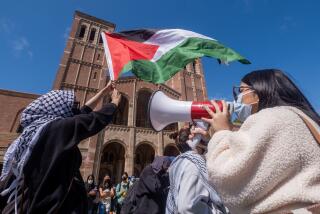Peacemaking in Balance as Israelis Vote
- Share via
JERUSALEM — With the Palestinian territories sealed off and 26,000 police and soldiers on guard against violence, Israelis began voting early today in a hard-fought national election that will determine the future of Middle East peacemaking.
About 700 polling stations opened at 7 a.m. on a quiet national election-day holiday. Schools, government offices and entertainment centers were closed for the voting.
Israeli soldiers in southern Lebanon, the West Bank and Gaza Strip began voting Tuesday in 66 special ballot boxes.
Prime Minister Shimon Peres and his challenger, Likud Party leader Benjamin Netanyahu, nicknamed “Bibi,” campaigned until the last minute Tuesday, with polls giving Peres such a slim lead that political analysts said the outcome was too close to call.
Two newspapers topped their front pages this morning with the simple headline: Peres or Bibi?
The election is, in effect, a referendum on the Labor Party government’s agreement with Palestinian leader Yasser Arafat to trade land for peace, and its intention to negotiate peace with neighboring Syria. Peres has urged Israelis to stay the course that he and slain Prime Minister Yitzhak Rabin began in 1993, while Netanyahu has focused on terrorist attacks by Islamic extremists and called the peace process a failure.
While Peres met with supporters in Labor strongholds along the Mediterranean coast, Netanyahu continued his pursuit of religious voters, meeting with a leading rabbi and making a high-profile stop in the mostly Arab Old City of Jerusalem to leave a note in the Western Wall. Ultra-Orthodox Jews, Israeli Arabs, Russian immigrants and young, first-time voters are expected to be determining factors in the vote.
Palestinian leaders had been urging the 2,200 Arab Israeli citizens of East Jerusalem to refrain from voting. But in a move apparently designed to boost Peres, Arafat’s Jerusalem representative, Faisal Husseini, said he no longer objected as long as they “give their vote to the right place.”
Also convinced that every ballot will count, thousands of Israelis of all persuasions streamed into Ben Gurion International Airport from abroad, making their way home to vote. Few of Israel’s 3.9 million registered voters boarded outgoing flights.
In such a tight race, analysts said party organization and get-out-the-vote drives would be critical.
Nearly 80% of registered voters have cast ballots in past elections. Officials called for Israelis to exercise their right to vote but urged citizens in the heavily armed country to leave their weapons at home when they do so.
Fearing attacks by Islamic extremists, the government has imposed closure on Palestinians in the West Bank and Gaza Strip. However, a spokesman for the militant Islamic movement Hamas said Tuesday that its military wing had accepted an appeal by Hamas political leaders to halt attacks against Israel before the vote.
“We have made our appeal, and although we have no organizational links [with armed brigades], the people have accepted the offer,” Mahmoud Zahhar told Reuters news agency in Gaza City.
In Washington, President Clinton insisted that the U.S. could not take sides in the election but would stand behind Israeli voters if they choose to continue seeking peace. “They have to make the decision whether they want to pursue the peace process or not,” he said. “But I can tell you this, if they decide to stay on the path of peace, we will share the risk, we will do what we can to minimize the risks. If they decide to stay for peace, we will do what we can to make sure that they can have security as well.”
Later, Clinton’s spokesman, Mike McCurry, said the president’s statements were not a sign that Clinton leaned toward Peres.
This is Israel’s first direct election for a prime minister, and Peres and Netanyahu are the only candidates. Voters will cast two ballots, one for prime minister and another for one of the 21 parties that are running candidates for parliament.
About half the parties, including one for men’s rights and another for senior citizens, are not expected to win the 1.5% of the votes required to gain seats in the 120-member parliament, called the Knesset. Seats are assigned in proportion to each party’s percentage of the total national vote.
Counting will be done by hand, but results of exit polls will be aired right after voting stations close. The Central Elections Committee has said it hopes to publish final results on Friday but that if counting is not complete by sundown on that day, it will be suspended until the end of the Jewish Sabbath.
The newly elected prime minister has 45 days after publication of the election results to form a government--one that the winner will have to negotiate with many of the small parties.
If the prime minister-elect fails to form a government, a special election for prime minister will be held within 60 days, but that outcome is seen as highly unlikely.
Times staff writer Paul Richter, in Washington, contributed to this story.
(BEGIN TEXT OF INFOBOX / INFOGRAPHIC)
21 Parties to Choose From
Twenty-one parties are vying for seats in Israel’s 120-seat parliament, or Knesset. Here is the number of seats they won in the last election in 1992:
LEFT WING (61)
* Labor: 44
* Meretz: 12
* Hadash: 3
* United Arab List: 2
****
RIGHT WING (49)
* Likud-Tsomet-Gesher: 40
* National Religious Party: 6
* Moledet: 3
****
ULTRA-ORTHODOX (10)
* Shas: 6
* United Torah Judaism: 4
****
PARTIES NOT IN KNESSET
* Aliyah Solidarity
* Men’s Rights
* Moreshet Avot
* Organization for Democratic Action
* Pensioners
* Progress Party
* Settlement Party
* Telem Emunah
* The Third Way
* Yemin Yisrael
* Yisrael Ba-Aliya
* Arab Party for Progress and Renewal
Source: Reuters
More to Read
Sign up for Essential California
The most important California stories and recommendations in your inbox every morning.
You may occasionally receive promotional content from the Los Angeles Times.













